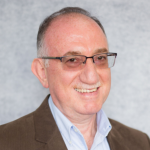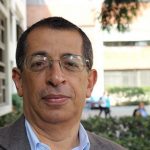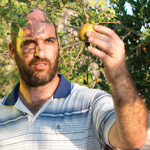
Hussein A. Amery
Associate Professor of International Studies
Colorado School of Mines
Dr. Hussein A. Amery is the Director of the Humanities, Arts and Social Sciences (HASS) Division at the Colorado School of Mines. He had also served as Associate Provost & Dean of Undergraduate Studies and Faculty, Interim Director of HASS, and as Director of its graduate program.
His academic expertise are in
- Water and food security in the Middle East, with a focus on the Arab Gulf states, and in
- Identifying indicators of risk of water wars in the Middle East, especially along the Litani, Jordan, Tigris and Euphrates rivers.
He recently published a book titled “Arab Water Security: Threats and Opportunities in the Gulf States” (Cambridge University Press, 2015). His earlier book is called “Water in the Middle East: A Geography of Peace” (Texas University Press; With A. T. Wolf). His academic contributions were recognized by his selection (2005) as Fellow by the International Water Association. Dr. Amery had been a consultant to U.S. government agencies, International Development and Research Center (Canada), and to American water engineering firms.

Jean A. Cahan
Director/Chair Norman and Bernice Harris Center for Judaic Studies
University of Nebraska – Lincoln
Jean Axelrad Cahan received an M.A. in European History from McGill University and a Ph.D in Philosophy from The Johns Hopkins University. She has taught and published in the areas of modern European philosophy, and modern Jewish thought and philosophy, for more than two decades. She is founding Director of the Harris Center for Judaic Studies and Faculty Fellow in the Daugherty Water for Food Global Institute at the University of Nebraska-Lincoln. She recently published an edited volume entitled: Water Security in the Middle East: Essays in Scientific and Social Cooperation (London 2017).

Yoram Cohen
UCLA Distinguished Professor of Chemistry and Biomolecular Engineering
University of California, Los Angeles
Dr. Cohen is a Distinguished Professor of Chemical & Biomolecular Engineering (CBE) at UCLA where is also on the Faculty of the Institute of the Environment and Sustainability. He holds the Rosalinde and Arthur Gilbert Foundation Chair and is a UCLA Luskin Scholar. He received his B.S. and M.S. in Chemical Engineering from the University of Toronto (1975, 1977), and a PhD from the University of Delaware (1981). He is Director of UCLA Water Technology Research (WaTeR), Director of the UCLA Younes and Soraya Nazarian Center for Israel Studies and Adjunct Professor at Ben-Gurion University. Dr. Cohen is co-founder and member of the UCLA/NSF Center for Environmental Implications of Nanotechnology (CEIN) which received the 2012 California Governor’s Award in Green Chemistry. He was a Visiting Professor at the Technion (1987-1988), Universitat Rovira i Virgili (1994) and Distinguished Visiting Professor at Victoria University (2006). He received the 2008 Ann C. Rosenfield Community Partnership Prize in recognition of his environmental research, the 2003 Lawrence K. Cecil award in Environmental Chemical Engineering from the American Institute of Chemical Engineers (AIChE), and was elected AIChE Fellow in 2009. In 2008 he received a County of Los Angeles Commendation, a State of California Senate Certificate of Recognition, and a Certificate of Special Congressional Recognition (US) for contributing to legislation to protect public health and dedicated service to the Los Angeles community. He is a recognized expert in water purification and desalination, membrane separation processes, environmental impact assessment, and nanoinformatics, with over 240 scholarly publications, 8 patents, and over 400 conference presentations and 170 invited talks. He developed patented water treatment and desalination technologies and new membranes, in addition to software for environmental impact assessment. Dr. Cohen has contributed to policy and regulatory efforts focused on environmental protection and economics of water reuse. His current research program focuses on smart distributed water systems, development of high performance RO and UF membranes, self-adaptive and energy optimal operation of membrane treatment systems, detection and mitigation of membrane fouling and mineral scaling, modeling of membrane transport processes, water reuse, and upgrading of impaired source water to provide safe drinking water to remote and disadvantage communities. He is also engaged on research focusing on the regional’s implications of Israel’s water and energy resources, and maintains an active collaborative research program with Israeli researchers on various aspects of membrane technology for water treatment and desalination.

Naftali Lazarovitch
Professor, Ben Gurion University of the Negev
French Associates Institute for Agriculture and Biotechnology of Drylands
Naftali Lazarovitch is an associate professor at the French Associates Institute for Agriculture and Biotechnology of Drylands, Jacob Blaustein Institutes for Desert Research, Ben-Gurion University of the Negev. He received his PhD in 2006 from the Hebrew University in Jerusalem. His main research interests are creating a better understanding of water flow and solute transport in the soil-plant-atmosphere system, increasing agricultural water use efficiency using optimal irrigation and fertigation scheduling and modeling (numerical and analytical), measurements and interpretation of water, heat and solute movement in the root zone.

Seth Snyder
Water Initiative Leader – Energy and Global Security
Argonne National Laboratory
Seth W. Snyder is the leader of Argonne National Laboratory’s water initiative. In this role, he coordinates work with other U.S. Department of Energy national laboratories to address the Energy-Water Nexus. He also coordinates a regional initiative in water investment in Chicago. Previously he served as Bioenergy Technology Manager and leader of Process Technology Research. He is a Senior Fellow in the University of Chicago’s Energy Policy Institute at Chicago. He is also a Fellow at the Institute of Molecular Engineering and the Northwestern-Argonne Institute for Science and Engineering.
He has developed and worked on leading technology and engineering in renewable energy, water, produced water, and energy efficiency. His work has resulted in 3 R&D 100 Awards and an FLC Award for Excellence in Technology Transfer. He has published over 60 papers, has 19 patents, and has had his work presented at over 90 conferences over the past decade. He recently published a book, Commercializing Biobased Products, for the Royal Society of Chemistry.
He co-founded AD Up Energy LLC to commercialize his group’s enhanced anaerobic digestion (wastewater) technology. He has an ongoing collaboration with Ben Gurion University of the Negev on membranes for wastewater treatment. He teaches a graduate course on energy and an undergraduate course on sustainability at Northwestern University. He is the former President of the Council for Chemical Research, a 501(c)(3).

Neda Zawahri
Associate Professor, Political Science
Cleveland State University
Neda Zawahri is an associate professor of political science at Cleveland State University working on issues of conflict and cooperation in the Middle East and South Asia over transboundary water resources. She has conducted extensive field research in the Middle East and South Asia. She is currently working on a project about building adaptive capacity to respond to climate change among the riparians sharing the Jordan, Euphrates, and Tigris Rivers. Professor Zawahri has published over 20 journal articles and book chapters. Her articles are published in International Studies Quarterly, Journal of Peace Research, Global Environmental Politics, Development and Change, and International Environmental Agreements among many other journals. She has also co-edited special issues that appeared in International Studies Quarterly, International Environmental Agreements, and International Negotiation. Professor Zawahri has won merit awards from her university for research and teaching.
Professor Zawahri has received several grants to both support her research and to establish programs at her university. She has been co-principal investigator on grants from the Social Science Research Council, U.S. Agency for International Development, Eisenhower Foundation, and two Title VI grants from the U.S. Department of Education. In the Middle East, she has advised nongovernmental organization, institutions, and states about means to build institutions to manage the region’s transboundary rivers and evaluate means to build regional peace.





